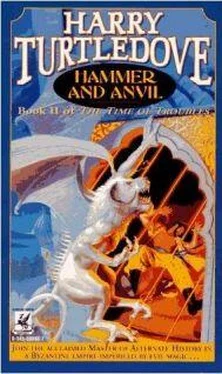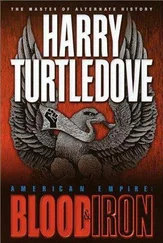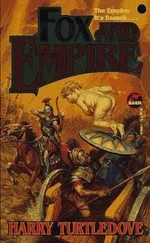At last, not long before sunset, his forces succeeded not in halting the Makuraners but in breaking free of them and being able to set up camp without getting attacked while they were going about it. A miserable camp it was, too. Wounded men groaned and cursed. Here and there, healer-priests labored to bring forth their curative magic and restore to health some warriors who had been grievously wounded.
As always, Maniakes watched the blue-robes with more than a little awe. When one of them laid hands on a man, even someone as blind to magic as the Avtokrator could sense the current of healing passing to the one who was hurt. And, when the priest took his hands away, the healed wound would look as if it had been suffered years before.
But the cost on the healer-priests was high. After each man they treated, they would emerge from their healing trance like men awakening from some killing labor after not enough rest. They would gulp food and swill down wine, then lurch on to the next desperate case. And, after they had healed two or perhaps three men each, they would fall asleep so deeply that even kicking at them did no more than make them stir and mutter.
Men whose hurts were not bad enough to require such drastic intervention made do with surgeons who drew arrows and sewed up gashes and poured wine over wounds to keep them from 'rotting. So the surgeons said, at any rate. Maniakes often wondered if they helped as many men as they hurt.
He strode through the camp, doing his best to keep up the soldiers' spirits. He found Bagdasares sitting on the ground with his head in his hands, as if afraid it would fall off if he didn't keep tight hold on it. "Magical sir, have you any skill in healing?" Maniakes asked.
Bagdasares looked up. "What's that?" he said blankly. "Oh, your Majesty. No, I'm sorry, I fear I have none whatever. Even among mages, healers are a special breed. Their gift can be trained if it is present, but it must be inborn; I know of no man without that innate talent who ever succeeded in relieving another's misery."
Maniakes sighed. "I thought you would say something of the sort, else you would have been laboring with the priests as best you could. By the good god, though, I wish it were otherwise. If you cannot heal, what can you accomplish for us in this joyless place?"
"Not even as much as a fighting man could," Bagdasares answered with a guilty frown. "All I'm good for is eating up food that might instead go to someone who has a chance of keeping both himself and me alive."
"How do we change that in the future?" Maniakes asked. "Wizards should not have so many limits on their sorcerous powers."
"We do better than we once did," Bagdasares said. "In the days of Stavrakios the Great, the healing art was but newly born, and as likely to kill a healer-priest as to cure the poor chap he was trying to save."
"We know more of other arts than they did in his day, too," Maniakes said. "I was thinking about that not so long ago-you read the accounts of his campaigns and you'll see he and his followers didn't know the use of stirrups. I wouldn't like to try riding without them, I tell you that."
He rubbed his chin, thinking how strange it was to be talking about changes from long-ago days after a lost battle. Even thinking about changes from long-ago days felt strange. He hadn't noted any changes in the way he lived through his whole lifetime, save those that went with his own change in age and station. He didn't ever remember his father talking about such changes, either; if they had gone on, they had done so at a pace too slow for any one man to notice.
But go on they had. A river would eventually shift its bed with the passing years. So, too, when you looked far enough, the course of human knowledge and endeavor shifted. He supposed that accumulation of slow, steady, but in the end significant changes had been growing since the day when Phos created Vaspur, firstborn of all mankind.
He let out a snort. If he was to be properly orthodox by Videssian standards, he could not let himself believe in the tale of Vaspur and other doctrinal matters the most holy Agathios would no doubt term heretical. He shook his head. No-he could not let himself be seen to believe in the tale of Vaspur and the rest.
"Your Majesty?" Bagdasares asked, wondering what the snort and the headshake meant.
"Never mind," Maniakes said. "Fuzz on the brain, that's all. Amazing, the notions I can come up with to keep from thinking about the mess we're in."
"Ah, yes," Bagdasares answered. "The mess we're in. What do we do about it? What can we do about it?"
"Nothing I can see," Maniakes said, the words bitter as alum in his mouth.
"Come morning, the Makuraners are going to attack us again. They'll have more men than we will, and they'll have their peckers up because they've beaten us once."
"They've beaten us more than once," Bagdasares said incautiously.
"Too true," Maniakes said. "So long as they keep it in mind-as we have to as well-it'll be worth extra men to their side… not that they'll need extra men tomorrow. They'll attack us, they'll beat us, and we'll have to retreat again. Pretty soon we'll be back in Garsavra, at the edge of the plateau." He scowled. "By the good god, pretty soon we'll be back in Videssos the city, with all the westlands lost."
"Surely it won't be so bad as that," Bagdasares said.
"You're right," Maniakes said glumly. "It's liable to be worse."
Scouts from the rear guard came galloping into Maniakes' miserable camp not long after dawn began painting the eastern sky with pink and gold. "The Makuraners are moving!" they shouted in tones that could have been no more horror-stricken were they announcing the end of the world.
As far as the Empire of Videssos went, they might as well have been announcing the end of the world.
Maniakes had hoped to mount a defense, maybe even a counterattack, against the men from Makuran. One look at his army's reaction to the news that the enemy was on the way drove that thought from his head. Men cried out in alarm. Some fled on foot; others made as if to rush the guards who were keeping watch on the long lines of tethered horses. No one showed the slightest eagerness to fight "What now, your Majesty?" Tzikas asked. He still wasn't saying I told you so, but by his expression he was thinking it very loudly now.
"We fall back," Maniakes answered bleakly. "What else can we do?" While Videssian military doctrine did not necessarily condemn retreat, after a while you got to the point where you had no room left in which to retreat. His situation in the westlands was rapidly approaching that point.
Tzikas sighed with more resignation than Maniakes could make himself feel.
"Ah, well, your Majesty," he said, evidently trying to console, "had we not run into them yesterday, they would have come upon us in short order."
"Which doesn't make our predicament here any better." Maniakes raised his voice to a shout that carried through the camp: "Parsmanios!"
His brother hurried up to his tent a couple of minutes later. "Aye, your Majesty?" he asked, as formally polite as if unrelated to the Avtokrator.
"You'll go from vanguard commander to rear guard today," Maniakes said. "I don't expect miracles; just try to keep 'em off us as best you can."
"I'll do whatever I'm able to," Parsmanios answered. He hurried away.
"Command me, your Majesty," Tzikas said.
Maniakes was reluctant to do that; he gauged Tzikas' obedience as springing more from policy than from conviction. But, without any choice, he said, "Stay by me. We'll fight side by side, as we did yesterday."
"Let it be as you say," Tzikas replied. Even as he spoke, the sound of Makuraner horns blown in excitement and triumph came faintly to Maniakes' ear across a rapidly shrinking stretch of ground.
Читать дальше












